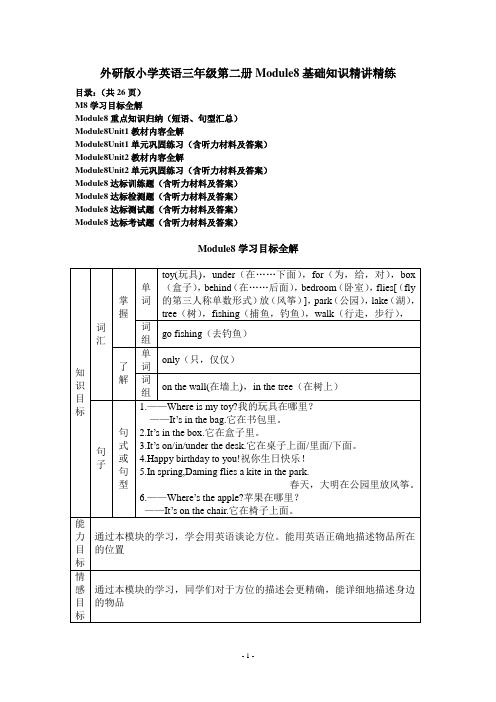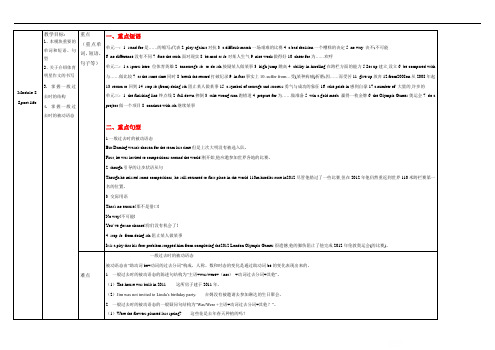Module8语法精练与易错归纳
- 格式:ppt
- 大小:1.33 MB
- 文档页数:18

Module8Storytime词句精讲精练Module 8 Story time词句精讲精练1. asleepasleep 是形容词,意为“睡着的” ,但它只能作表语,不能⽤very 修饰,只能⽤much、fast 等词修饰。
它作定语时,只能位于所修饰词之后。
反义词为“awake ”。
例如:Don'ttalk loud when others are asleep. 别⼈睡着的时候不要⼤声说话。
The boy asleep is my brother. 那个睡着的男孩是我弟弟。
【拓展】be asleep、go to sle ep、go to bed 和sleep 的辨析:(1)be asleep表⽰“睡着”的状态。
例如:The baby is fast asleep. 那个婴⼉睡得很熟。
(2)go to sleep = get to sleep = fall asleep 强调进⼊梦乡的动作。
例如:He was just falling asleep when there was a loud knock at the door.他刚睡着,就有⼈使劲敲门。
I don't know when I went to sleep / got to sleep last night. 我不知道昨晚什么时候睡着的。
(3)go to bed意为“就寝,上床睡觉”,着重指上床准备睡觉的动作。
⼀般来说,go to bed在前,然后才go to sleep 或fall asleep。
例如:He usually goes to bed at ten and goes to sleep five minutes later.他通常⼗点上床睡觉,五分钟后⼊睡。
(4)sleep强调“睡觉”动作,是延续性动词,可与表⽰时间段的状语连⽤。
例如:Did you sleep well last night? 你昨晚睡得好吗?2. pickpick意为“采,摘”,常⽤于词组“ pick up ”,意为“拾起,捡起”,当宾语为代词时,宾语应放在pick 和up 中间;当宾语为名词时,宾语可放中间,也可放在后⾯。

班级姓名学号分数Module 8 Accidents单元重点单词词组短语句型精练(时间:60分钟,满分:100分)一、用括号内所给单词的适当形式填空(本大题共30小题,每小题1分,共30分)1.It's said that the police ___________(try) their best to catch the robbers these days.2.We must work hard at the __________(begin) of the new school year.3.He _________(lie) in bed and read a book, but soon he felt asleep.4.We will go to the USA as soon as the holiday ___________(begin).5.We all know that trees can produce oxygen to keep people __________(live).6.I ______ (walk) along the road when a car hit the old man.7.—It’s very ______ (danger) for the kids to play in the street.—I agree with you.8.Look! They are waiting ______ (cross) the road.9.When I hear the sound of the ball ______ (hit) the floor, my heart follows its beat.10.She ______ (not want) to stay in bed while the others ______ (work) in the fields.11.When the traffic lights are red, we must stop ______ (walk).12.Please pay attention to ______ (spell) the new words, boys and girls.13.Lucy went out today without ______ (tell) me where she was going.14.A large number of students ______ (like) PE best of all the subjects.15.After the whole day’s work, Mr. King is a bit ______ (tire).16.Tomorrow's weather will be much ________(bad) than today.17.Mrs Hunt spent lots of money buying ________(medicine).18.Jeff went into the house and ________(throw) his shoes on the floor.19.Jack was in ________(pain) because his fish died.20.The children tried ______ (go) to school by themselves.21.Lingling’s father went to Beijing on business a few days ______ (early).22.I ______ (read) a novel last night when I heard the knocks at the door.23.Soon his leg began ______ (hurt) after Tom had an accident.24.Mr Bethune hurried ______ (operate) on the injured soldiers though he had already worked for a long time. 25.While Dad and I ________(swim) in the river, it started to rain.26.My mum was cooking when my brother ________(arrive) home.27.—Did you hear the loud noise around 10:30 last night?—No, I _______(watch) my favourite TV programme in the living room.28.While Mary ________(read), her brother ________(sleep) in his bedroom.29.As the doctor was checking him, the light ________(go) off.30.Last summer, they ________(e) to Hong Kong and ________(visit) me.二、根据句意及首字母或汉语提示完成单词(本大题共30小题,每小题1分,共30分) 31.If you are ill, you should go to see the doctor and take some m______.32.I cut my finger yesterday. Now it h_________.33.She tried to attract the waiter's __________(注意力).34.The famous star refused to be __________(采访).35.Where did you ___________(躲藏)? I didn't find you.36.While Alan was playing with his dog, it ________(咬) him.37.There are all kinds of ________(冰箱) in the shop.38.________(爬) the first hill took us about an hour.39.Emma ________(躲藏) behind the door, so her brother couldn't find her.40.Cindy's p_______ face shows that she isn't feeling well now.41.A smile a________ on Mum's face when she heard the good news.42.—What happened, Jane?—There was an accident. A car h_______ a bus.43.—Mr. Wang saved the girl's life at the r________ of losing his life.—How great he was!44.I'm sure your parents will be g_______ to hear from you.45.The actor didn’t ______ (出现) at the party.46.I found a little boy crying at the street ______ (拐角).47.When the boy saw the accident happen, his face turned ______ (苍白的).48.Now more and more people realize the r____ of smoking.49.Suddenly, a rabbit ran so fast that it h____ a tree.50.I saw an a____ on my way to school. A man fell off his motorbike.51.I have a cold. I must take some m____.52.It’s not right to t____ litter (垃圾) here and there.53.We usually put the food in the f____ in summer.54.You must see a doctor in time, or you’ll be w____.55.Look! The lovely panda is c____ up the tree.56.I waited for my friend Davy at the gate of the park. But he did not a____ until six o’clock. 57.She cried in p____ when her tooth was pulled out.58.Please be careful when you go across the road, or a car may h____ you.59.She looks very ______ (苍白的).What’s wrong with her?60.I want this beer to chill (冰冻) so I’ll leave it in the ______ (冰箱) for an hour.三、完成句子(本大题共10小题,每小题2分,共20分)61.那个人痛苦地躺在那儿。

外研版八年级下册Module 8知识点整理一.重点单词hardly adv.几乎不;几乎没sights n.[用复数]风景;名胜thirsty adj.渴的waste v.&n.浪费;滥用kilometre n.千米;公里shape n.外形;形状human n.人wake v.唤醒;醒来somebody pron.某人;有人about adv.向四周;向各处path n.小路;路径pull v.(用手)拉,牵,扯二.重点短语1.time off休假2.in the city centre在市中心3.be famous for因……而著名4.take up占去(时间或空间)5.point out指出;指明6.at the top of.在……的顶端7.look like看起来像8.wake sb. up唤醒某人9.move about 四处走动10. not…any more不再11.do sightseeing 观光12. be careful小心13. be popular with受……欢迎三.用法集萃1.so...that+从句如此……以至于……2.welcome to+地点欢迎来到……3. hear sb. doing sth 听到某人正在做某事4. allow sb. to do sth 允许某人做某事5.promise to do sth.答应/许诺做某事6.without doing sth 没做某事7.hope to do sth希望做某事8.the+序数词十形容词最高级第几……的9. would like sb.to do sth. 想要某人做某事四.重点句型1.1 can hardly believe we're in the city centre.我几乎不能相信我们在市中心。
2.I don't think they allow people to swim in the lake.3.我认为他们不允许人们在湖里游泳。

外研版小学英语三年级第二册Module8基础知识精讲精练目录:(共26页)M8学习目标全解Module8重点知识归纳(短语、句型汇总)Module8Unit1教材内容全解Module8Unit1单元巩固练习(含听力材料及答案)Module8Unit2教材内容全解Module8Unit2单元巩固练习(含听力材料及答案)Module8达标训练题(含听力材料及答案)Module8达标检测题(含听力材料及答案)Module8达标测试题(含听力材料及答案)Module8达标考试题(含听力材料及答案)Module8学习目标全解Module8重点知识归纳Module8重点学习如何描述事物的位置。
现将本模块主要句型及相关知识归纳如下:一、习惯搭配/短语1.on your desk在你的书桌上2.a present/gift for sb.给某人的礼物 a present for you送给你的一份礼物3.in the box在盒子里4.under the chair在椅子下5.in your bedroom在你的卧室里6.Happy birthday to you!祝你生日快乐!7.in the cap在帽子里8.fly a kite放风筝9.in the park在公园里10、in spring在春天11.in summer在夏天12.in the lake在湖里13.in autumn在秋天14.go fishing钓鱼15.under the tree在树下16.in winter在冬天17.walk in the snow在雪上走18.on the chair在椅子上19.on the desk在书桌上20.on the wall在墙上21.up there on the wall 在墙上那上面22.two for the monkey给猴子的两个23.in the tree在树里/上24.only eight bananas仅仅八个香蕉25.in the bag在书包里26.in the bag/box/bedroom/cap/lake/park在……里27.under the chair/tree/desk/book/cat在……下面28.behind the door/tree在……后面二、惯用表达式1.A present for you.给你的一件礼物。

Module 8 Sport life 教学目标:1、本模块重要的单词和短语、句型2、关于介绍体育明星作文的书写3. 掌握一般过去时的结构4. 掌握一般过去时的被动语态重点(重点单词,短语,句子等)一、重点短语单元一:1. stand for是……的缩写;代表2. play against对抗3. a difficult match一场艰难的比赛4. a bad decision一个糟糕的决定5. no way 决不;不可能6.no difference没有不同7. face the truth面对现实8. be mad at sb.对某人生气9. nice work做得好10. cheer for为……欢呼单元二:1.a sports hero 位体育英雄2. encourage sb. to do sth鼓励某人做某事3. high jump跳高4. ability in hurdling在跨栏方面的能力5.Set up建立,设立6. be compared with与……做比较7. at the same time同时8. break the record打破纪录9. in fact事实上10. suffer from…受(某种病痛)折磨;因……而受苦11. give up放弃12.from2008on从2008年起13. return to回到14. stop sb.(from) doing sth阻止某人做某事15. a symbol of courage and success勇气与成功的象征16. take pride in感到自豪17.a number of 大量的,许多的单元三:1. the finishing line终点线2. fall down摔倒3. take wrong turn跑错道4. prepare for为……做准备5. win a gold meda 赢得一枚金牌6. the Olympic Games奥运会7. do aproject做一个项目8. continue with sth.继续某事二、重点句型1.一般过去时的被动语态But Daming wasn't chosen for the team last time.但是上次大明没有被选入队。

知识图谱Module 8 Accidents知识精讲一、必背词汇1、pale [peil]adj. 苍白的2、appear [ə'piə] vi. 出现;显露3、round [raund] prep. 转到(某物的)另一边4、corner ['kɔ:nə] n. 街角,拐角5、hit [hit] vt. (使)碰撞6、glad [glæd]adj.高兴的;欢喜的7、medicine ['medisin] n. 药;药物8、worse [wə:s]adj. 更坏的;更坏的。
adv. 更糟;更坏9、risk [risk] n. 风险;危险10、attention [ə'tenʃən] n. 注意力11、pain [pein] n. 疼痛;痛12、side [said]n. (物体或形状的)侧面13、fridge [fridʒ] n. 冰箱14、bite [bait] vt.(bi[biti])咬;叮15、climb [klaim] vi. 爬;攀爬16、hide [haid] v.(hid[hid])躲藏;躲17、throw [θrəu] vt. 投;掷二、重点词汇1. appear verb /əˈpɪər/to start to be seen or to be present出现;呈现;显现1). He suddenly appeared in the doorway.他突然出现在门口。
2). We’d been in the house a month when dark stains started appearing on the wall.墙上开始出现一些深色的斑迹时,我们在这幢房子里已经住了一个月。
2. hit verb /hɪt/to move your hand or an object onto the surface of something so that it touches it, usually with force 击;打;撞1). Teachers are not allowed to hit their pupils.不允许教师打学生。
第一招同音词记忆法学方法英语中有很多单词发音相同,利用单词的发音来记忆同音单词也是一种记忆单词的方法。
too(也)— two(二)eye(眼睛)— I(我)想一想,写出下列单词的同音词,并写出中文意思。
1.sea(大海)—()2.their(他们的)—()第二招一般过去时态记忆法描述某人在过去某个时间做过某事此句是一般过去时的肯定句,句型结构为“主语+动词过去式+其他+ last +时间名词.”,用来描述某人在过去某个时间做过某事。
表示过去时间的短语有:last Sunday 上星期last Saturday 上星期六last night 昨晚last July去年七月last year 去年last week 上星期last month 上个月last summer 去年夏天We went to the cinema last week.我们上星期去了电影院。
一、单项选择。
()1.选择与图片意思相符的句子,将序号填在括号里。
A.My family and I watched TV last night.B .I am not watching TV .C .We are going to the cinema .( )2.你要告诉老师“昨天我吃了许多食物,并且喝了果汁”,你应该说:A .I ate lots of food and drink juice yesterday .B .I eat lots of food and drank juice yesterday .C .I ate lots of food and drank juice yesterday .二、选词填空。
1.He (go /went)to Beijing last Sunday .2.She drank some drinks (tomorrow /yesterday).第三招 介词使用记忆法描述某人过去乘坐交通工具去了某地 此句型用来描述某人过去乘坐交通工具去了某地。
Module 8 易错知识点练习一、单项选择1.Jim wants to play with his friends at night,but his parents don't allow him ________ so.A.do B.doesC.to do D.doing2.I heard Tom ________ when I walked past his room yesterday.A.sing B.singingC.to sing D.sang3.I shall not ________ much of your time.A.take in B.take offC.take up D.take away4.Her sister is famous ________ a singer and she is famous ________ her beautiful voice.A.for;as B.as;forC.for;for D.as;as5.—How's Susan?—Oh,I ________ see her because she lives abroad.A.always B.oftenC.almost D.hardly6. Bob is taking the desks away because they ________ too much room.A.stand up B.pick up C.take up D.listen up7. I haven't decided when ________ a holiday yet.A.took B.taking C.to take D.take8. —That mountain in Guilin ________ an elephant.—So it does.It's amazing!A.looks up B.looks like C.looks for D.looks after9. Daisy is such a good daughter that she ________ most of her spare time with herparents.A.spends B.costs C.takes D.affords10. —I am too tired to walk any farther,Jack.—________,Daniel.You can do it.A.No hurry B.No problemC.That's all D.Come on11. Hangzhou is famous ________ its silk in China.A.from B.at C.in D.for12. I couldn't do it ________ your great help.Thanks a lot!A.with B.without C.for D.to13. Some students can do very well in English exams,but can ________ understand what a native speaker of English says.A.exactly B.always C.easily D.hardly14. Lanzhou is the only capital city that the Yellow River,the second ________ river in China,passes through.A.long B.longest C.longer D.length15. Mr Li,there is someone in the next room ________ would like to speak with you. A./ B.who C.which D.whom二、根据句意和汉语提示写出所缺的单词1. —How far is it from here to the factory?—It’s about five _______(公里).2. I don’t know the _______(形状) of the stone.3. Please ______(唤醒) me up at six o’clock in the morning.4. Walk along the _______(小路) and turn right at the corner.5. Don’t ______(拉) the door. You should push it.三、用括号内所给单词的适当形式填空1.I want (go)camping with my sister this Sunday.2.We would like to go to the city and go (sightsee)there.3.—Can you tell me how (take)good photos,Mr Wang?—Of course.4.—What do you think of the (late)film?—Exciting.5.Tom woke up in the middle of the night and he couldn't fall (sleep)any more.四、用方框中所给短语的适当形式完成下列句子,使句子通顺、正确look for,look like,pull...off,come out,be famous for1.I a flower a plant yesterday.2.With those shoes you a dancer.3.France its delicious food.4.Stars as soon as it was dark.5.We must somewhere to live.五、根据汉语意思完成句子1. 这张桌子占了太多空间,所以我把它搬了出去。
Module 8 Accidents一、重点词组1、look pale 看起来脸色苍白2、listen to 听3、pay attention 注意4、side by side 肩并肩5、in time 及时6、fall off… 从……跌落7、pick up 捡起二、重点句型1、You look pale.感官动词: look / smell / taste / sound / feel + adj.2、A boy was riding his bike and listening to music on the road.Be (was/were) + doing 过去进行时3、The boy fell off his bike and hurt his knee.区分:fall down 跌倒fall off 跌落fall over 绊倒1)fall over强调的是“向前摔倒、脸朝下跌倒”。
2) fall down强调的是“滑倒、倒下”,后接宾语时应加上介词from。
3) fall off强调的是“跌落、从……掉下来”,后直接接宾语。
4、Pay attention.祈使句的特点:1)省略主语You;2)动词用原型。
1、Don’t ride side by side with your friends.side by side 肩并肩,一起,并排shoulder to shoulder 肩并肩neck and neck 并驾齐驱,不分上下2、What else?疑问词/ 复合不定代词+ else7、I was trying to pick it up.1) 区分:try to do sth & try doing sthtry to do sth.设法/尽力做某事(侧重尽力,为了达到目的而努力)try doing sth.试着/试验做某事(新的尝试,并没有一定明显的目的性) 2) 区分:pick up pick out pick onpick up捡起, 获得, 学会pick out 挑选pick on作弄, 惹恼, 找...的岔子三、重点语法点1、过去进行时(M7)表示在过去某一时刻或某一段时间内进行或发生的动作。
2021~2022学年新课标外研版初中英语学习讲义八年级下学期Module 8课文知识点总结笔记Module 8 Time off语法:that引导的宾语从句一、放在动词后面的句子,称为“宾语从句”二、可分为三类:一类是that引导的宾语从句;一类是whether/ if引导的宾语从句;一类是连接代词,连接副词引导的宾语从句。
三、that引导的宾语从句1.宾语从句的引导词是that,当谓语动词表示肯定的概念,如“希望”“相信”“知道”或“说”时,后面的句子一般用that引导,that没有任何意义。
只有语法功能,目的使读者清楚后面的句子是宾语从句,that可省略。
接that引导的宾语从句的动词有:believe, expect, explain, feel, hear, hope, imagine, prefer, promise, report, say, see, tell, think, understand, warn, wish 等。
引导that用于下列情况时不可省略:(1)当宾语从句的主语是that时,Eg: He says that that is a useful book.(2)当从句前有插入语时Eg: It says, on the card, that it is made in China.(3)当宾语从句中含主从复合句时Eg: I’m afraid that if you’ve lost it, you must pay for it.(4)当两个或多个宾语从句由并列连词连接时,除第一个从句中的that 可省略外,其余从句中的that都不可省略Eg: He said (that) the film was very interesting and that he enjoyed seeing it very much.2.宾语从句的时态:(1)主句是现在的某种时态,那么宾语从句的时态可根据实际情况而定Eg: (1) I remember he gave me a book yesterday.(2) He has told me that he’ll leave for New York tomorrow.(2)如果主句是过去的某种时态,宾语从句一定要用过去的某种时态。